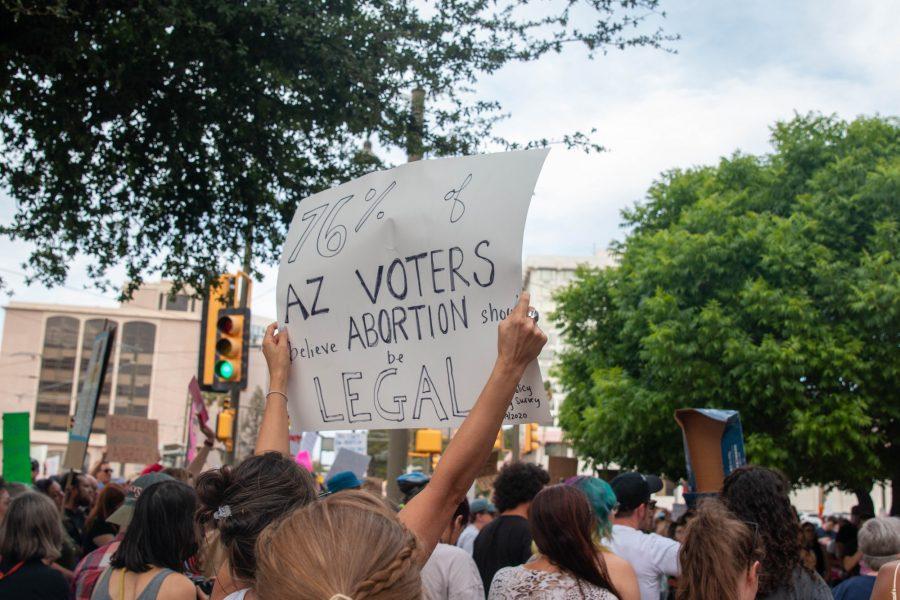Supreme Court overturns Roe v. Wade
Pro-choice activists gather at the steps of the Tucson Courthouse to protest a recent news leak about the U.S. Supreme Court leaning towards approving the reversal of federal abortion laws. These activists made signs to spread awareness to people passing by on Tuesday, May 3.
June 24, 2022
The U.S. Supreme Court has overturned Roe v. Wade nearly 50 years after the landmark ruling and two weeks after Tucson mayor and council voted to protect abortion rights.
In a 6-3 decision on the case Dobbs v. Jackson Women’s Health Organization, the Supreme Court voted to uphold the state of Mississippi’s ban on abortions after the first 15 weeks of pregnancy. As part of the decision, the Court also overturned both Roe v. Wade and Planned Parenthood v. Casey.
Roe v. Wade is a 1973 case in which the ruling of the Supreme Court effectively established a constitutional right to abortion. The 1992 ruling on Planned Parenthood v. Casey reaffirmed the court’s decision on Roe, in addition to providing a new standard for assessing abortion regulations.
The overturning of Roe now leaves the legality and regulation of abortion up to the discretion of the states.
Associate Justice Samuel Alito penned the majority’s opinion on Dobbs and was joined by Justices Clarence Thomas, Neil Gorsuch, Brett Kavanaugh and Amy Coney Barrett.
Chief Justice John Roberts wrote a concurring opinion arguing that he would have upheld Mississippi’s abortion ban but would not have overturned Roe. Justices Stephen Breyer, Sonia Sotomayor and Elena Kagan wrote a joint dissenting opinion.
This decision comes two weeks after Tucson Mayor Regina Romero and her council passed a resolution protecting abortion rights, which went into effect immediately June 7.
Under this resolution, the Tucson Police Department will be directed to not arrest anyone who gives or helps give any abortions. Instead, complaints, if made, will be sent to the Arizona Department of Health Services for further investigation.
Ever since the Supreme Court leak on Roe v. Wade came out in May, Romero has been publicly vocal in support of abortion rights.
“I am devastated, and I am pissed off and I am not surprised,” Romero said while giving a speech at a mid May pro-choice rally co-organized by Women’s March and Planned Parenthood covered by the Daily Wildcat.
Arizona never passed a state trigger law, a law passed by a state that immediately outlaws abortion in the event Roe is overturned. Following Dobbs, three states’ trigger laws will immediately go into effect: South Dakota, Louisiana and Kentucky.
According to Politico, 10 other states have trigger laws that first require certification from the attorney general, governor or legislature of a state before activation. These states are Arkansas, Idaho, Mississippi, Missouri, North Dakota, Oklahoma, Tennessee, Texas, Utah and Wyoming.
While Arizona might not have a trigger law in place, it does currently prohibit abortion after 15 weeks of pregnancy, similar to Mississippi. The law, signed by Arizona Gov. Doug Ducey in March, does not include any exemptions for rape and incest but does include exemptions for life-threatening medical emergencies.
“Though not unexpected, this infringement of our rights is hard to accept,” Romero said on Twitter in response to the final Supreme Court decision.
Follow JT Thorpe and Kristijan Barnjak on Twitter



